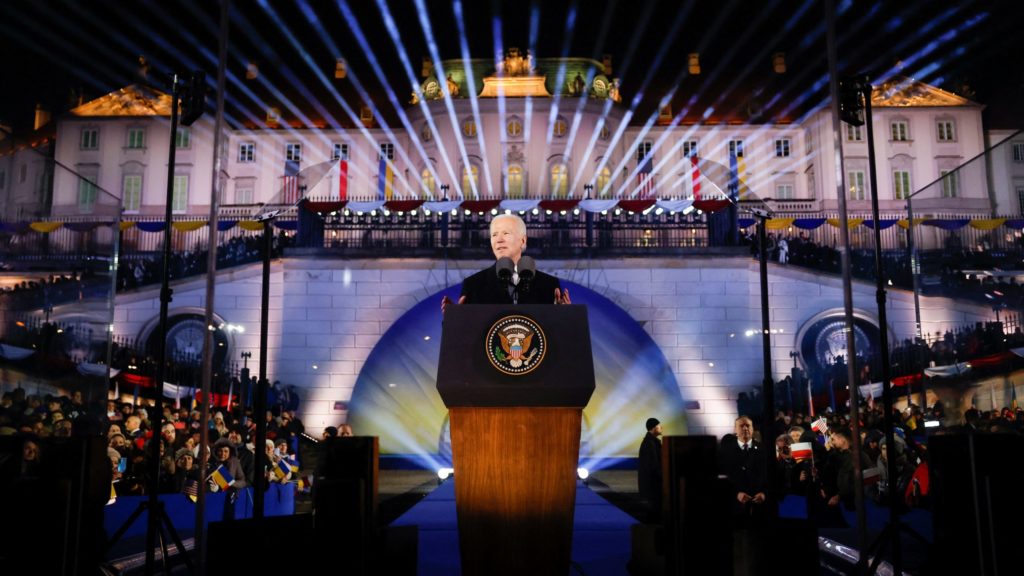Three leaders of NATO member states – and, as it happens, three Roman Catholic laity deeply involved in politics – all issued stirring defenses of Ukraine this week, as the one-year anniversary of its war with Russia approaches tomorrow.
US President Joe Biden delivered a forceful speech in Warsaw Tuesday in which he vowed that the free world “will not tire” in its support for Ukraine, thundering that “tyrants” such as Russia’s Vladimir Putin only understand the word “no,” while his host, Polish President Andrzej Duda, insisted that “Ukraine must win this war.”
At the same moment that Biden and Duda’s tête-à-tête was playing out, Italian Prime Minister Giorgia Meloni was in the Ukrainian city of Bucha, site of a 2022 massacre by Russian forces that left nearly 500 people dead, to tell Ukrainians that Italy “will be with you until the end.”
“You’re not alone,” Meloni told the Ukrainians. “We will fight for your freedom.”
In his own speech Tuesday, Duda explicitly cited the example of Pope John Paul II, whose support of the Solidarity movement in Poland in the late 1970s and 1980s helped set the dominos in motion that led to the collapse of the Soviet empire.
“The Pope, St. John Paul II, spoke of solidarity,” Duda said. “Nobody can oppose what we obtained through solidarity. Thanks to our efforts, we broke the chain of communism and we entered the free world. We helped open up the Iron Curtain.”
“This was thanks to human solidarity, and today it allows us to help the Ukrainians,” the Polish leader said.
In a joint news conference with Biden, Duda again made a glowing reference to John Paul.
The defeat of the Soviets, Duda said, was in part “thanks to the movement of Solidarity, of course, here in Poland; thanks to the determination of the people; thanks to the influence exerted by Saint John Paul II, whom we admire so much.”
Biden, Duda and Meloni, to say the least, are very different kinds of Catholics.
Biden is an old-school American Catholic liberal, politically cut from the same ethnically Catholic, working class cloth as, say, the late Governor Mario Cuomo of New York. Duda, on the other hand, is a Polish Catholic nationalist, a product of the country’s Law and Justice Party which enjoys strong support in the more traditional quarters of Polish Catholicism.
Meloni, though a self-described “Christian,” has never really worn her faith on her sleeve. Among other things, she has a daughter out of wedlock with her longtime partner Andrea Giambruno. She’s essentially a secular conservative, more interested in economic policy and foreign affairs than the culture wars, and her roots aren’t in Catholic social activism but in Italy’s post-fascist right-wing circles.
Despite those divergences, Biden, Duda and Meloni today are united in their support for Ukraine and opposition to Russia. Whether they’re aware of it or not, Catholic social teaching as articulated after the Second Vatican Council, with its emphasis on human rights, democracy and personal freedom, likely has influenced their outlook. Duda perceives that the Western defense of freedom in central and eastern Europe are in continuity with the vision of John Paul II; whether Biden and Meloni would put things that way almost doesn’t matter, because they’re operating out of the John Paul playbook regardless.
Pope John Paul II’s legacy, in other words, is alive and well and living in Kyiv.
The spirit of John Paul II is also thriving today in Washington, Warsaw and Rome – anywhere, really, where Catholics involved in public life, whatever their ideological differences on other fronts, are once again involved in trying to sustain a moral campaign of resistance to Russian-imposed tyranny.
As a footnote, Biden and Meloni might do well to steal a page from Duda and become more explicit in appealing to the spiritual underpinnings of their positions on Ukraine, since Putin is attempting to position himself and Russia as the great defenders of religious faith against the increasingly godless West.
In his state of the nation address Tuesday, Putin cited recent developments within the Anglican Communion, including the blessing of same-sex unions and the idea of using gender neutral vocabulary in talking about God, as harbingers of a looming “spiritual catastrophe.”
“May God forgive them for they know not what they do,” Putin said.
“Look at what they do with their own peoples: the destruction of the family, cultural and national identity, perversion, and the abuse of children are declared the norm,” Putin continued. “And priests are forced to bless same-sex marriages.”
“We have to protect our children from degradation and degeneration,” Putin insisted, “and we will.”
However self-serving that sort of rhetoric may be, there’s no denying its appeal in regions such as sub-Saharan Africa, the Middle East and much of Asia, where religious faith and traditional morality still play enormous roles in shaping culture – and, not coincidentally, where most governments so far have stayed non-aligned.
To the extent that Western leaders can make clear that their resistance to Russia’s offensive is a cause with religious and spiritual roots, it could help broaden the pro-Ukraine coalition by blunting one of Putin’s more effective rhetorical tropes.
For his part, Pope Francis has tried to remain even-handed on the conflict, expressing keen sympathy for Ukrainian victims of the war while also suggesting some legitimacy to Russia’s claims of NATO aggression. Yesterday during his General Audience, Francis said that “real victory” in Ukraine “cannot be built on ruins.”
In that sense, Francis is sort of the yin to John Paul’s more aggressive yang. Time will tell whether these two papal forces are actually complementary, and together can help restore harmony to the geopolitical cosmos.
For now, it’s enough to note that although there’s only one pope at a time, Ukraine proves that two papal legacies definitely can share the same stage.

